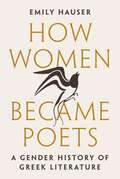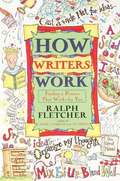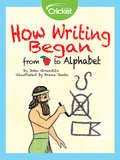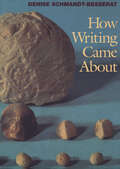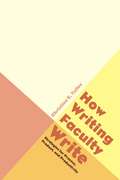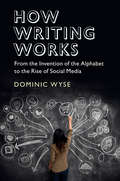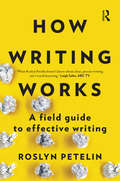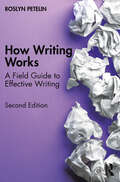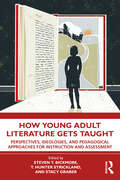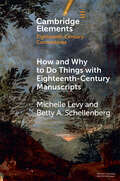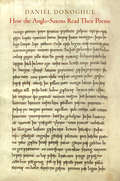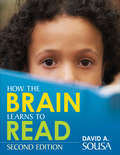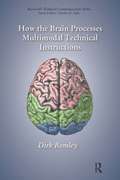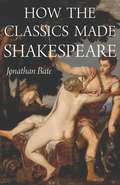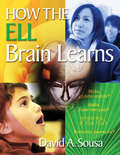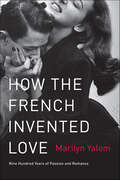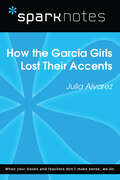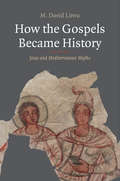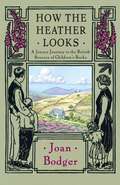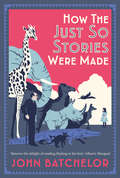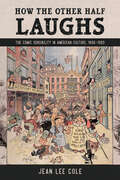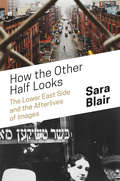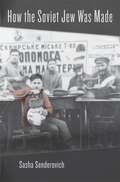- Table View
- List View
How Women Became Poets: A Gender History of Greek Literature
by Emily HauserHow the idea of the author was born in the battleground of genderWhen Sappho sang her songs, the only word that existed to describe a poet was a male one—aoidos, or “singer-man.” The most famous woman poet of ancient Greece, whose craft was one of words, had no words with which to talk about who she was and what she did. In How Women Became Poets, Emily Hauser rewrites the story of Greek literature as one of gender, arguing that the ways the Greeks talked about their identity as poets constructed, played with, and broke down gender expectations that literature was for men alone. Bringing together recent studies in ancient authorship, gender, and performativity, Hauser offers a new history of classical literature that redefines the canon as a constant struggle to be heard through, and sometimes despite, gender.Women, as Virginia Woolf recognized, need rooms of their own in order to write. So, too, have women writers through history needed a name to describe what it is they do. Hauser traces the invention of that name in ancient Greece, exploring the archaeology of the gendering of the poet. She follows ancient Greek poets, philosophers, and historians as they developed and debated the vocabulary for authorship on the battleground of gender—building up and reinforcing the word for male poet, then in response creating a language with which to describe women who write. Crucially, Hauser reinserts women into the traditionally all-male canon of Greek literature, arguing for the centrality of their role in shaping ideas around authorship and literary production.
How Writers Work
by Ralph FletcherThe Secret of WritingIts misleading to think of writers as special creatures, word sorcerers who possess some sort of magic knowledge hidden from everyone else. Writers are ordinary people who like to write. They feel the urge to write, and scratch that itch every chance they have. Writers get their ideas down on paper using particular strategies that seem to work for them. These strategies are available to anyone who wants to be a writer... Revealed!There is no secret. But there is a process. If you like to write, there are definite steps you can take to help you reach your goals. Good writing isn't forged by magic or hatched out of thin air. Good writing happens when human beings follow particular steps to take control o their sentences-to make their words do what they want them to do.This book will show you how writers work, how you can become a writer, and how you can find a process that works for you
How Writing Began: From Apple to Alphabet
by John GranditsA long time, humans did not have writing. At some point, people began using symbols and then pictures.
How Writing Came About
by Denise Schmandt-BesseratIn 1992, the University of Texas Press published Before Writing, Volume I: From Counting to Cuneiform and Before Writing, Volume II: A Catalog of Near Eastern Tokens. In these two volumes, Denise Schmandt-Besserat set forth her groundbreaking theory that the cuneiform script invented in the Near East in the late fourth millennium B. C. -the world's oldest known system of writing-derived from an archaic counting device. How Writing Came About draws material from both volumes to present Schmandt-Besserat's theory for a wide public and classroom audience. Based on the analysis and interpretation of a selection of 8,000 tokens or counters from 116 sites in Iran, Iraq, the Levant, and Turkey, it documents the immediate precursor of the cuneiform script.
How Writing Faculty Write: Strategies for Process, Product, and Productivity
by Christine E. TulleyIn How Writing Faculty Write, Christine Tulley examines the composing processes of fifteen faculty leaders in the field of rhetoric and writing, revealing through in-depth interviews how each scholar develops ideas, conducts research, drafts and revises a manuscript, and pursues publication. The book shows how productive writing faculty draw on their disciplinary knowledge to adopt attitudes and strategies that not only increase their chances of successful publication but also cultivate writing habits that sustain them over the course of their academic careers. The diverse interviews present opportunities for students and teachers to extrapolate from the personal experience of established scholars to their own writing and professional lives. Tulley illuminates a long-unstudied corner of the discipline: the writing habits of theorists, researchers, and teachers of writing. Her interviewees speak candidly about overcoming difficulties in their writing processes on a daily basis, using strategies for getting started and restarted, avoiding writer’s block, finding and using small moments of time, and connecting their writing processes to their teaching. How Writing Faculty Write will be of significant interest to students and scholars across the spectrum—graduate students entering the discipline, new faculty and novice scholars thinking about their writing lives, mid-level and senior faculty curious about how scholars research and write, historians of rhetoric and composition, and metadisciplinary scholars.
How Writing Works
by Dominic WyseFrom the invention of the alphabet to the explosion of the internet, Dominic Wyse takes us on a unique journey into the process of writing. Starting with seven extraordinary examples that serve as a backdrop to the themes explored, it pays particular attention to key developments in the history of language, including Aristotle's grammar through socio-cultural multimodality, to pragmatist philosophy of communication. Analogies with music are used as a comparator throughout the book, yielding radically new insights into composition processes. The book presents the first comprehensive analysis of the Paris Review Interviews with the world's greatest writers such as Louise Erdrich, Gabriel Garcia Mrquez, Ted Hughes, and Marilynne Robinson. It critically reviews the most influential guides to styles and standards of language, and presents new research on young people's creativity and writing. Drawing on over twenty years of findings, Wyse presents research-informed innovative practices to demonstrate powerfully how writing can be learned and taught.
How Writing Works: A field guide to effective writing
by Roslyn PetelinThis is Roslyn Petelin's promise: whether you already write reasonably well or not, this book will exponentially improve your writing.How Writing Works is a lively and practical introduction to the elements of grammar, sentence structure, and style that you need to write well. The book covers social media and writing for online publication, as well as the most common documents in the university and the writing-reliant workplace.How Writing Works should be on the desk of everyone who needs to write: students, professionals in all fields, and creative writers.'A superb guide to great writing in the modern media era.' Phil Harding, journalist and broadcaster, London'Whether you're a CEO or an intern, the ability to communicate clearly is your biggest asset. Petelin's expert advice in this book will accelerate your career'. Damian Kington, Global Head of Marketing, Liquidnet, New York
How Writing Works: A field guide to effective writing
by Roslyn PetelinThis is an engaging and practical introduction to the elements of grammar, sentence structure, and style that you need to write well across a range of academic, creative, and professional contexts, deftly combining practical strategies with scholarly principles. The second edition includes updated material based on a longstanding commitment to writing and to best international practice. It includes advice on reading; language; grammar and style; structuring; designing; paragraphing; punctuation; workplace and academic documents; digital writing for social media; and revising, editing, and proofreading. How Writing Works should be on the desk of everyone who needs to write: students, professionals in all fields, and creative writers. It is an essential handbook for working writers and writing workers in the contemporary writing-reliant workplace. The accompanying companion website includes video interviews and presentations from leading grammarians including Professor David Crystal and Professor Geoff Pullum, in addition to online quizzes and activities to support readers’ learning.
How Young Adult Literature Gets Taught: Perspectives, Ideologies, and Pedagogical Approaches for Instruction and Assessment
by Steven T. Bickmore T. Hunter Strickland Stacy GraberA manual for teaching Young Adult Literature, this textbook presents perspectives and methods on how to organize and teach literature in engaging and inclusive ways that meet specific educational and programmatic goals. Each chapter is written by an expert and offers a rich and nuanced approach to teaching YA Literature through a distinct lens. The effective and creative ways to construct a course explored in this book include multimodal, historical, social justice, place-based approaches, and more. The broad spectrum of topics covered in the text gives pre-service teachers and students a toolbox to select and apply methods of their choosing that support effective reading and writing instruction in their own contexts, motivate students, and foster meaningful conversations in the classroom. Chapters feature consistent sections for theory and practice, course structure, suggestions for activities and assessments, and takeaways for further discussion to facilitate easy implementation in the classroom. This book is an essential text for pre-service teachers of English as well as professors and scholars of Young Adult Literature.
How a Comic Book is Made (Fountas & Pinnell LLI Red #Level P)
by Michael SandlerPeople around the world love colorful, action-packed comic books. Find out who makes comic books, and how they do it.
How a Seed Grows
by Holly Schroeder Denny BondThe fun and excitement of English and Language Arts learning continues in Grade 2 of Reading Street. This comprehensive and dynamic curriculum for homeschooling is geared toward young children who have some foundational English and Language Arts knowledge and are ready to strengthen their skills. Comprised of engaging activities, challenging content and weekly quizzes, Reading Street: Grade 2 is the next step in your child's path toward becoming a lifelong learner and reader. As with all Reading Street products, the Grade 2 system is formatted to help students meet certain age-appropriate goals. After completing this English and Language Arts homeschool program, your child should be able to: Read and comprehend two-syllable words. Identify common prefixes (such as pre-, un-, or re-) and suffixes (such as -able, -ad and -er). Correct mistakes made when reading out loud. Read books with two or more chapters. Understand the structure of stores (i. e. beginning, middle and end). Start selecting reading materials based on his/her own interests. Identify the "who," "what," "when," "where," "why" and "how" of the text. While the goals of second Grade English and Language Arts are numerous, Reading Street will help you craft engrossing lessons. Your child will garner important English and Language Arts skills while completing a workbook, reading stories and poems, and taking assessments. Planning these lessons will be easier than ever, as all Reading Street systems are broken down into weekly Big Ideas. All the work your child does on a given week is formulated around that single concept for an organized and challenging curriculum. With six easy-to-follow units, Reading Street: Grade 2 is the perfect tool for homeschooling parents. Your child will enjoy the reading selections and activities, and you'll love to see your student growing into a knowledgeable individual. We're confident that this product is the right one for you. For more information on the specific materials found in Grade 2 of Reading Street, check out the Features and Benefits page.
How and Why to Do Things with Eighteenth-Century Manuscripts (Elements in Eighteenth-Century Connections)
by Betty A. Schellenberg Michelle LevyThis Element examines eighteenth-century manuscript forms, their functions in the literary landscape of their time, and the challenges and practices of manuscript study today. Drawing on both literary studies and book history, Levy and Schellenberg offer a guide to the principal forms of literary activity carried out in handwritten manuscripts produced in the first era of print dominance, 1730-1820. After an opening survey of sociable literary culture and its manuscript forms, numerous case studies explore what can be learned from three manuscript types: the verse miscellany, the familiar correspondence, and manuscripts of literary works that were printed. A final section considers issues of manuscript remediation up to the present, focusing particularly on digital remediation. The Element concludes with a brief case study of the movement of Phillis Wheatley's poems between manuscript and print. This title is also available as Open Access on Cambridge Core.
How the Anglo-Saxons Read Their Poems (The Middle Ages Series)
by Daniel DonoghueThe scribes of early medieval England wrote out their vernacular poems using a format that looks primitive to our eyes because it lacks the familiar visual cues of verse lineation, marks of punctuation, and capital letters. The paradox is that scribes had those tools at their disposal, which they deployed in other kinds of writing, but when it came to their vernacular poems they turned to a sparser presentation. How could they afford to be so indifferent? The answer lies in the expertise that Anglo-Saxon readers brought to the task. From a lifelong immersion in a tradition of oral poetics they acquired a sophisticated yet intuitive understanding of verse conventions, such that when their eyes scanned the lines written out margin-to-margin, they could pinpoint with ease such features as alliteration, metrical units, and clause boundaries, because those features are interwoven in the poetic text itself. Such holistic reading practices find a surprising source of support in present-day eye-movement studies, which track the complex choreography between eye and brain and show, for example, how the minimal punctuation in manuscripts snaps into focus when viewed as part of a comprehensive system.How the Anglo-Saxons Read Their Poems uncovers a sophisticated collaboration between scribes and the earliest readers of poems like Beowulf, The Wanderer, and The Dream of the Rood. In addressing a basic question that no previous study has adequately answered, it pursues an ambitious synthesis of a number of fields usually kept separate: oral theory, paleography, syntax, and prosody. To these philological topics Daniel Donoghue adds insights from the growing field of cognitive psychology. According to Donoghue, the earliest readers of Old English poems deployed a unique set of skills that enabled them to navigate a daunting task with apparent ease. For them reading was both a matter of technical proficiency and a social practice.
How the Brain Learns to Read
by Dr David A. SousaA modern classic, updated for today’s classroom needs No skill is more fundamental to our students’ education than reading. And no recent book has done more to advance our understanding of the neuroscience behind this so-critical skill than David Sousa’s How the Brain Learns to Read. Top among the second edition’s many new features are: Correlations to the Common Core State Standards A new chapter on how to teach for comprehension Much more on helping older struggling readers master subject-area content Ways to tailor strategies to the unique needs of struggling learners Key links between how the brain learns spoken and written language
How the Brain Processes Multimodal Technical Instructions (Baywood's Technical Communications)
by Dirk RemleyWhile Aristotle acknowledges the connection between rhetoric, biology, and cognitive abilities, scholarship continues to struggle to integrate the fields of rhetoric and neurobiology. Drawing on recent work in neurorhetoric, this book offers a model that integrates multimodal rhetorical theory and multisensory neural processing theory pertaining to cognition and learning. Using existing theories from multimodal rhetoric and specific findings from neurobiological studies, the author develops a model that integrates concepts from both fields, bridging, if not uniting, them. He also discusses possible applications of the new model, with specific case studies related to training and instruction. These applications include various media used in instructional and training contexts, such as print, slide shows, videos, simulations, and hands-on training. The book thus introduces concepts of cognitive neuroscience to multimodal rhetorical theory and facilitates theorization combining multimodal rhetoric and multisensory cognition, and serves as a vehicle by which readers can better understand the links between multimodal rhetoric and cognitive neuroscience associated with technical communication. Integrating case studies from industry and practice, the text makes explicit connections between academic scholarship and workplace preparation. It also describes how interdisciplinary research can contribute to pharmaceutical research, as well as the development of productive instructional materials. Rhetoric is affected by how the brain of any member of a given audience can process information. This book can promote further research-qualitative and quantitative-to develop a better understanding of the relationship between multimodal messages and how the brain processes such information.
How the Classics Made Shakespeare (E. H. Gombrich Lecture Series #3)
by Jonathan BateFrom one of our most eminent and accessible literary critics, a groundbreaking account of how the Greek and Roman classics forged Shakespeare’s imaginationBen Jonson famously accused Shakespeare of having “small Latin and less Greek.” But he was exaggerating. Shakespeare was steeped in the classics. Shaped by his grammar school education in Roman literature, history, and rhetoric, he moved to London, a city that modeled itself on ancient Rome. He worked in a theatrical profession that had inherited the conventions and forms of classical drama, and he read deeply in Ovid, Virgil, and Seneca. In a book of extraordinary range, acclaimed literary critic and biographer Jonathan Bate, one of the world’s leading authorities on Shakespeare, offers groundbreaking insights into how, perhaps more than any other influence, the classics made Shakespeare the writer he became.Revealing in new depth the influence of Cicero and Horace on Shakespeare and finding new links between him and classical traditions, ranging from myths and magic to monuments and politics, Bate offers striking new readings of a wide array of the plays and poems. At the heart of the book is an argument that Shakespeare’s supreme valuation of the force of imagination was honed by the classical tradition and designed as a defense of poetry and theater in a hostile world of emergent Puritanism.Rounded off with a fascinating account of how Shakespeare became our modern classic and has ended up playing much the same role for us as the Greek and Roman classics did for him, How the Classics Made Shakespeare combines stylistic brilliance, accessibility, and scholarship, demonstrating why Jonathan Bate is one of our most eminent and readable literary critics.
How the ELL Brain Learns
by Dr David A. SousaRaise your ELL success quotient and watch student achievement soar! How the ELL Brain Learns combines current research on how the brain learns language with strategies for teaching English language learners. Award-winning author and brain research expert David A. Sousa describes the linguistic reorganization needed to acquire another language after the age of 5 years. He supplements this knowledge with immediately applicable tools, including: A self-assessment pretest for gauging your understanding of how the brain learns languages Brain-compatible strategies for teaching both English learners across content areas An entire chapter about how to detect English language learning problems
How the French Invented Love: Nine Hundred Years of Passion and Romance
by Marilyn Yalom“Absolutely marvelous…lively and learned….Marilyn Yalom’s book is a distinguished contribution to our experience of a great literature, as well as an endearing memoir.” —Diane Johnson, author of Lulu in Marrakech and Le Divorce“[An] enchanting tour of French literature—from Abelard and Heloise in the 12th century to Marguerite Duras in the 20th and Philippe Sollers in the 21st.” —Publishers Weekly (starred review)How the French Invented Love is an entertaining and masterful history of love à la française by acclaimed scholar Marilyn Yalom. Spanning the Middle Ages to the present, Yalom explores a love-obsessed culture through its great works of literature—from Moliere’s comic love to the tragic love of Racine, from the existential love of Simone de Beauvoir and Jean-Paul Sartre to the romanticism of George Sand and Alfred de Musset. A thoroughly engaging homage to French culture and literature interlaced with the author’s delicious personal anecdotes, How the French Invented Love is ideal for fans of Alain de Botton, Adam Gopnik, and Simon Schama.
How the Garcia Girls Lost Their Accents (SparkNotes Literature Guide Series)
by SparkNotesHow the Garcia Girls Lost Their Accents (SparkNotes Literature Guide) by Julia Alvarez Making the reading experience fun! Created by Harvard students for students everywhere, SparkNotes is a new breed of study guide: smarter, better, faster. Geared to what today's students need to know, SparkNotes provides: *Chapter-by-chapter analysis *Explanations of key themes, motifs, and symbols *A review quiz and essay topicsLively and accessible, these guides are perfect for late-night studying and writing papers
How the Gospels Became History: Jesus and Mediterranean Myths (Synkrisis)
by M. David LitwaA compelling comparison of the gospels and Greco-Roman mythology which shows that the gospels were not perceived as myths, but as historical records Did the early Christians believe their myths? Like most ancient—and modern—people, early Christians made efforts to present their myths in the most believable ways. In this eye-opening work, M. David Litwa explores how and why what later became the four canonical gospels take on a historical cast that remains vitally important for many Christians today. Offering an in-depth comparison with other Greco-Roman stories that have been shaped to seem like history, Litwa shows how the evangelists responded to the pressures of Greco-Roman literary culture by using well-known historiographical tropes such as the mention of famous rulers and kings, geographical notices, the introduction of eyewitnesses, vivid presentation, alternative reports, and so on. In this way, the evangelists deliberately shaped myths about Jesus into historical discourse to maximize their believability for ancient audiences.
How the Heather Looks: A Joyous Journey to the British Sources of Children's Books
by Joan BodgerOver forty years ago, Joan Bodger, her husband, and two children went to Britain on a very special family quest. They were seeking the world that they knew and loved through children's books. In Winnie-the-Pooh Country, Mrs. Milne showed them the way to "that enchanted place on the top of the Forest [where] a little boy and his Bear will always be playing." In Edinburgh they stood outside Robert Louis Stevenson's childhood home, tilting their heads to talk to a lamplighter who was doing his job. In the Lake District they visited Jemima Puddle-Duck's farm, and Joan sought out crusty Arthur Ransome to talk to him about Swallows and Amazons. They spent several days "messing about in boats" on the River Thames, looking for Toad Hall and other places described by Kenneth Grahame in The Wind in the Willows. Mud and flood kept them from attaining the slopes of Pook's Hill (on Rudyard Kipling's farm), but they scaled the heights of Tintagel. As in all good fairy tales, there were unanswered questions. Did they really find Camelot? Robin Hood, as always, remains elusive.One thing is certain. Joan Bodger brings alive again the magic of the stories we love to remember. She persuades us that, like Emily Dickinson, even if we "have never seen a moor," we can imagine "how the heather looks."First published in 1965 by Viking in New York, How the Heather Looks has become a prized favorite among knowledgeable lovers of children's literature. Precious, well-thumbed copies have been lent out with caution and reluctance, while new admirers have gone searching in vain for copies to buy second-hand. This handsome reprint, with a new Afterword by Joan Bodger, makes a unique and delightful classic available once more.
How the Just So Stories Were Made: The Brilliance and Tragedy Behind Kipling's Celebrated Tales for Little Children
by John BatchelorA fascinating, richly illustrated exploration of the poignant origins of Rudyard Kipling&’s world-famous children&’s classic&“In this concise and remarkable book . . . Batchelor guides us expertly . . . drawing on multiple sources and making intriguing connections between Kipling&’s stories for children and for adults.&”—John Carey, The Sunday Times From "How the Leopard Got Its Spots" to "The Elephant&’s Child," Rudyard Kipling&’s Just So Stories have delighted readers across the world for more than a century. In this original study, John Batchelor explores the artistry with which Kipling created the Just So Stories, using each tale as an entry point into the writer&’s life and work—including the tragedy that shadows much of the volume, the death of his daughter Josephine. Batchelor details the playful challenges the stories made to contemporary society. In his stories Kipling played with biblical and other stories of creation and imagined fantastical tales of animals' development and man's discovery of literacy. Richly illustrated with original drawings and family photographs, this account reveals Kipling&’s public and private lives—and sheds new light on a much-loved and tremendously influential classic.
How the Other Half Laughs: The Comic Sensibility in American Culture, 1895-1920
by Jean Lee ColeHonorable Mention Recipient for the Charles Hatfield Book PrizeTaking up the role of laughter in society, How the Other Half Laughs: The Comic Sensibility in American Culture, 1895–1920 examines an era in which the US population was becoming increasingly multiethnic and multiracial. Comic artists and writers, hoping to create works that would appeal to a diverse audience, had to formulate a method for making the “other half” laugh. In magazine fiction, vaudeville, and the comic strip, the oppressive conditions of the poor and the marginalized were portrayed unflinchingly, yet with a distinctly comic sensibility that grew out of caricature and ethnic humor.Author Jean Lee Cole analyzes Progressive Era popular culture, providing a critical angle to approach visual and literary humor about ethnicity—how avenues of comedy serve as expressions of solidarity, commiseration, and empowerment. Cole’s argument centers on the comic sensibility, which she defines as a performative act that fosters feelings of solidarity and community among the marginalized. Cole stresses the connections between the worlds of art, journalism, and literature and the people who produced them—including George Herriman, R. F. Outcault, Rudolph Dirks, Jimmy Swinnerton, George Luks, and William Glackens—and traces the form’s emergence in the pages of Joseph Pulitzer’s New York World and William Randolph Hearst’s Journal-American and how it influenced popular fiction, illustration, and art. How the Other Half Laughs restores the newspaper comic strip to its rightful place as a transformative element of American culture at the turn into the twentieth century.
How the Other Half Looks: The Lower East Side and the Afterlives of Images
by Sara BlairHow New York’s Lower East Side inspired new ways of seeing AmericaNew York City's Lower East Side, long viewed as the space of what Jacob Riis notoriously called the "other half," was also a crucible for experimentation in photography, film, literature, and visual technologies. This book takes an unprecedented look at the practices of observation that emerged from this critical site of encounter, showing how they have informed literary and everyday narratives of America, its citizens, and its possible futures.Taking readers from the mid-nineteenth century to the present, Sara Blair traces the career of the Lower East Side as a place where image-makers, writers, and social reformers tested new techniques for apprehending America--and their subjects looked back, confronting the means used to represent them. This dynamic shaped the birth of American photojournalism, the writings of Stephen Crane and Abraham Cahan, and the forms of early cinema. During the 1930s, the emptying ghetto opened contested views of the modern city, animating the work of such writers and photographers as Henry Roth, Walker Evans, and Ben Shahn. After World War II, the Lower East Side became a key resource for imagining poetic revolution, as in the work of Allen Ginsberg and LeRoi Jones, and exploring dystopian futures, from Cold War atomic strikes to the death of print culture and the threat of climate change.How the Other Half Looks reveals how the Lower East Side has inspired new ways of looking—and looking back—that have shaped literary and popular expression as well as American modernity.
How the Soviet Jew Was Made
by Sasha SenderovichA close reading of postrevolutionary Russian and Yiddish literature and film recasts the Soviet Jew as a novel cultural figure: not just a minority but an ambivalent character navigating between the Jewish past and Bolshevik modernity.The Russian Revolution of 1917 transformed the Jewish community of the former tsarist empire. In particular, the Bolshevik government eliminated the requirement that most Jews reside in the Pale of Settlement in what had been Russia’s western borderlands. Many Jews quickly exited the shtetls, seeking prospects elsewhere. Some left for bigger cities, others for Europe, America, or Palestine. Thousands tried their luck in the newly established Jewish Autonomous Region in the Far East, where urban merchants would become tillers of the soil. For these Jews, Soviet modernity meant freedom, the possibility of the new, and the pressure to discard old ways of life.This ambivalence was embodied in the Soviet Jew—not just a descriptive demographic term but a novel cultural figure. In insightful readings of Yiddish and Russian literature, films, and reportage, Sasha Senderovich finds characters traversing space and history and carrying with them the dislodged practices and archetypes of a lost Jewish world. There is the Siberian settler of Viktor Fink’s Jews in the Taiga, the folkloric trickster of Isaac Babel, and the fragmented, bickering family of Moyshe Kulbak’s The Zemlenyaners, whose insular lives are disrupted by the march of technological, political, and social change. There is the collector of ethnographic tidbits, the pogrom survivor, the émigré who repatriates to the USSR.Senderovich urges us to see the Soviet Jew anew, as not only a minority but also a particular kind of liminal being. How the Soviet Jew Was Made emerges as a profound meditation on culture and identity in a shifting landscape.
